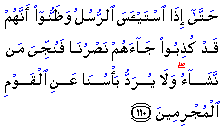Lofty Affair, Sitting in Between, Religious Laws
Issue 478 » May 23, 2008 - Jumada-al-Awwal 18, 1429
Living The Quran
Yusuf (Joseph)
Chapter 12: Verse 110
 Lofty Affair
Lofty Affair
Till, when the Messengers despaired (of their people) and thought that they were treated as liars, then came Our help, and whom We would was saved. And Our wrath cannot be warded from the guilty.
This is Allah's way with regard to the Mission brought by the Prophets: there can be no escape from hardships and inflictions until nothing of the strength and energy is left for expenditure. It is only when every apparent means to which people cling, and depend on, have disappeared, that help comes, relieving those who deserve to be relieved, while others - the criminal minded, and the arrogant ones - have the destruction delivered on themselves, with no help and relief from any quarter.
This, in order that help and relief from Allah does not become cheap and the Mission and the Call treated lightly. The call to truth is a lofty affair that stands to transform the lives of the people. It must, therefore, be saved from false callers: those who cannot bear the hardships that accompany it. The false ones soon realize what it means to be in the field, and, usually, abandon it sooner than one would expect. Help comes to those who remain on the tracks, without losing heart, despite their realization that after all, Allah's help might not come during their own lives. But, a day will arrive, after a long or short struggle, when Allah will intervene, send His help, and the masses will enter His way of life enmasse.
Source:
"In The Shade of The Quran" - Sayyid Qutb
Understanding The Prophet's Life
Sitting Between Two People
If you enter a room, do not sit between two people. Instead, sit on their left or right. Abu Dawud reported that the Messenger of Allah, peace be upon him, said: "No one is to sit between two people without their permission."
Sometimes people will be kind enough to favour you by making room for you to sit between them. Acknowledge this kind gesture by thankfully accepting their offer. Be grateful and good mannered, do not sit cross-legged to crowd them out.
If you are seated next to two people, do not eavesdrop and listen to what they say, lest their conversation be a confidential or a private matter. Eavesdropping is a bad habit and a sin. Al-Bukhari reported that the Messenger of Allah said: "Whoever listens to people's conversation against their wishes will be punished by liquid lead being poured down their ears on the Day of Judgment."
Source:
“Islamic Manners” – Abdul Fattah Abu Ghudda, pp. 45, 46
Blindspot!
Religious Laws
Royal authority implies a form of organisation necessary to mankind. It requires superiority and force, which express the wrathfulness and animality (of human nature). The decisions of the ruler will therefore, as a rule, deviate from what is right. They will be ruinous to the worldly affairs of the people under his control, since, as a rule, he forces them to execute his intentions and desires, and this may be beyond their ability. This situation will differ according to the intentions to be found in the different generations. It is for this reason difficult to be obedient to the ruler. Disobedience makes itself noticeable and leads to trouble and bloodshed.
Therefore, it is necessary to have reference to ordained political norms, which are accepted by the mass, and to whose laws it submits. The Persians and other nations had such norms. The dynasty that does not have a policy based on such (norms) cannot fully succeed in establishing the supremacy of its rule.
If these norms are ordained by the intelligent and leading personalities and the minds of the dynasty, the result will be a political (institution) with an intellectual basis. If they are ordained by God through a lawgiver who establishes them as (religious) laws, the result will be a political (institution) with a religious basis, which will be useful for life in both this and the other world.
This is because the purpose of human beings is not only their worldly welfare. This entire world is trifling and futile. It ends in death and annihilation. The purpose (of human beings) is their religion, which leads them to happiness in the other world. Therefore, religious laws have as their purpose to cause (them) to follow such a course in all their dealings with God and their fellow men. This (situation) also applies to royal authority, which is natural in human social organisation. (The religious laws) guide it along the path of religion, so that everything will be under the supervision of the religious law. Anything (done by royal authority) that is dictated by force, superiority or the free play of the power of the wrathfulness, is tyranny and injustice and considered reprehensible by (the religious law), as it is also considered reprehensible by the requirements of political wisdom. Likewise, anything (done by royal authority) that is dictated by considerations of policy or political decisions without supervision of the religious law, is also reprehensible, because it is vision lacking the divine light. At the resurrection, the actions of human beings, whether they had to do with royal authority or anything else, will all come back to them.
Source:
"Al Muqaddimah" - Ibn Khaldun, Chapter 3, Section 23